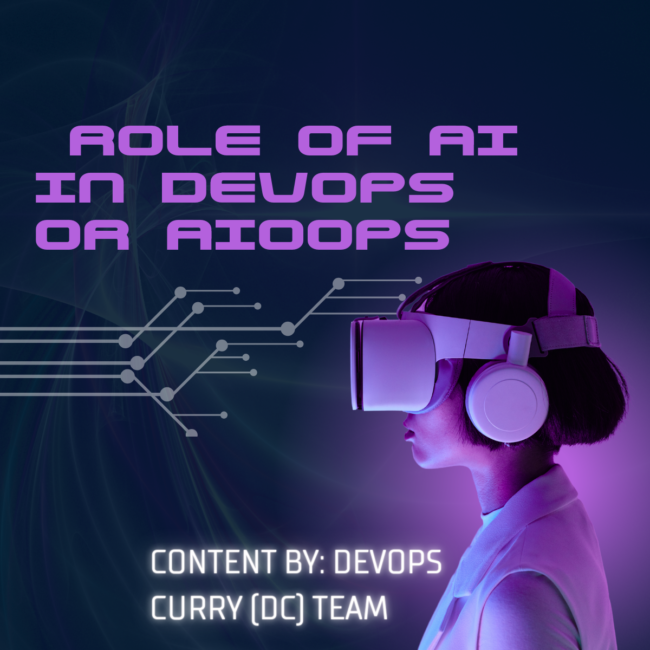Role of Integrating AI in DevOps or AIOOps
How Integrating AI is transforming DevOps ?
Integrating AI; Integrating AI is transforming DevOps by putting forwards automation, collaboration, decision making. Integrating AI Security is one of the most important integration of AI and DevOps. By facing so many problems AI can help the DevOps teams and these two combinedly work together. AI is more useful for data analysis. It collect the data from different sources for an integrated company. Now-a-days in the market there are some AI tools which is becoming popular and these are ChatGPT, Bard, DALL-E and many organization are utilizing generative AI to save there company cost and work in more efficiency. Combining both AI & DevOps practices needs integration of AI tools, planning, data science team, development and operations. Both helps in increasing the speed and quality of software development and operation. AI-driven tools can automatically implement, create and analyze tests. They can find out the most important test cases and foresee which parts of the code are most likely to fail.
What is DevOps ?
Before going to understand integrating AI into DevOps lifestyle its important to known more about DevOps , so let’s understand more about DevOps. A Process that integrates IT operations, practice, tools, software development And contributes the outstanding characteristics of software with the endless delivery.
It characterizes the take on the renewal of programmable infrastructure and expenditure, software development, industrialization. In a company, it stimulates alliance and transmission. DevOps have some procedures such as the CI/CD tool (Continuous Integration/ Continuous Delivery) with an intensity of task automation. Microservice, Container, and Executing together with the DevOps methodologies. Though it is clear that it has some methodologies, it is not a technology.
The two words define DevOps (software development and Operations) and in other words, you can say the assortment of software development and operation is known as DevOps. It enhances the speed and quality of the application that has been delivering to an enormous extent and that’s why it’s becoming more prominent for the organization. It provides you with the faster speed, security for your code, delivered quickly, these are some of the important features of using DevOps.
How to implement Integrating AI in DevOps
There are some steps to provide a good integration that improves the DevOps processes and these steps are mentioned below:
♦ Choose The Correct Technologies Of AI and Frameworks
As per your need, you can choose the best AI technology tools and some basic tools consists computer vision, machine learning and natural learning processing. There are some famous AI models such as PyTorch, scikit-learn and TensorFlow. You can choose AI technology as per your need that means suppose if you want to build custom machine learning model then you can go for TensorFlow, if your organizations and you need high-level neural networks API then you can go for Keras and if you need visualization, analysis and data aggregation then you can go for ELK Stack (Elasticsearch, Logstash,Kibana).
♦ Data Collection and Preprocessing
Transform raw data into thoughtful characteristics that can be utilized by AI model, It also make sure the data is free from noise and inconsistencies. It collect the data such as logs, user feedback, metrics and other important data from several stages of the DevOps pipelines.
♦ Recognize The Use Cases
There is an automated testing that is to execute , organize and create tests. It also continuously analyze the feedback from several stages and suggest improvements. It recognize unusual patterns that might indicate security breaches or system malfunctions. It forecast system failures, performance problem or resources utilization.
Benefits Of Integrating AI In DevOps
There are any benefits of AI in DevOps and some of are as follow:
♦ Automated CI/CD: It helps to automated to CI/CD pipeline and also helps to decrease the in hand errors & increases the speed of development cycle. It is one of the most important benefits of incorporating AI into DevOps. It can improve the CI/CD pipeline by automating several tasks, as like testing, deployment, code compilation and decreasing the time required to deliver latest characteristics and fixes.
♦ Automated testing: By automated testing AI helps to decreases the testing and improve the performance of software. It perform extensive testing, consist of integrating and unit testing. This features of AI helps in DevOps as well.
♦ Solve Queries Quickly: By the enactment of machine learning and NLP (Natural Language Processing) AI helps in communication and collaboration in DevOps. It is available every time as 24 hours to solves the problems of users quickly and also has the capacity to share the knowledge. This is the reasons that AI solves the issues of users quickly.
♦ Chatbots: Chatbots functions of AI helps the users to solves there problem quickly from operational and development team and Chatbot also helps in communication and collaboration. This function of AI is also beneficial for DevOps.
♦ Security: As we know security is important in both AI & DevOps. So, the AI functions of security checks and response mechanisms, enhancing whole security system. AI model is best for security because it can examine huge amounts of data from system logs, network traffic and user behaviors to find out unusual patterns. AI can predict potential security threats by analyzing historical data and identifying trends.
Conclusion
Integrating AI into the DevOps lifecycle is a transformative approach that enhances automation, efficiency, and security. By leveraging AI for predictive analytics, automated testing, incident management, and continuous monitoring, organizations can streamline their DevOps processes and ensure a more resilient and adaptive infrastructure. AI-driven insights enable proactive decision-making, helping teams anticipate and mitigate risks before they escalate into critical issues.

